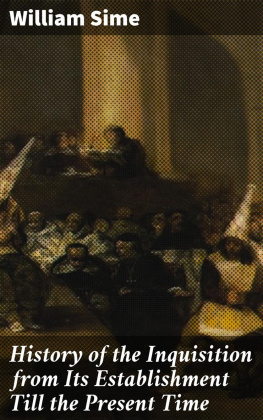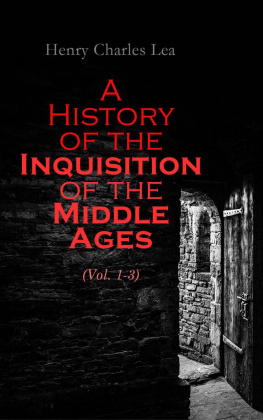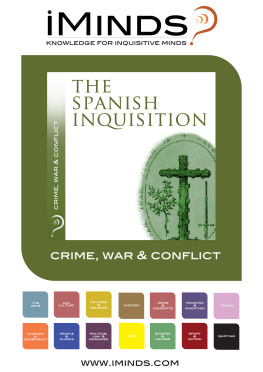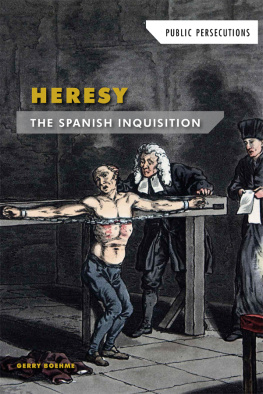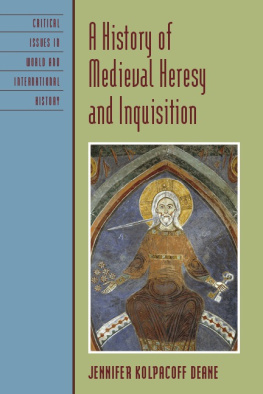CHAPTER I.
Table of Contents
Persecution for religious opinions, opposed to the spirit of Christianityits increase with the growth of the Papal authoritythe foundation of the Inquisition laid by Regnier and GuyBirth and education of St. Dominichis erection of the Inquisition, and thirst for human bloodprocedure of the first Inquisitorserection of inquisitorial tribunals in different countries.
Nothing is more evident to every candid reader of the inspired volume, than that persecution in any form is utterly opposed to the spirit of genuine Christianity. "Learn of me," said the Saviour, when he proposed himself as a model for his followers, "for I am meek and lowly in heart;" and following up his principles of mildness, he reproved the indiscreet zeal of James and John, when they sought to call down fire from heaven to consume the Samaritans, because they refused to receive them into one of their villages. Nay, so far from giving his disciples a power to persecute, the Divine Founder of the Christian religion foretold them that they must suffer persecution for his name. This they soon experienced; but, instead of rendering evil for evil, they "approved themselves as the ministers of God, by much patience, by afflictions, necessities, distresses, stripes, and imprisonments;" thus showing by example, as well as by precept, that "the weapons of their warfare were not carnal, but spiritual."
While the objects of persecution, the Christians acted agreeably to these principles, and for three centuries contended, that persecution for religious opinions is not only absurd, but unjust and cruel in the highest degree. "Every one," says Tertullian, "hath a natural right and power to worship according to his persuasion; for no man's religion can be hurtful or profitable to his neighbour." "There is no need of compulsion and violence," says Lactantius, "because religion cannot be forced, and men must be made willing, not by stripes, but by arguments." The maxims of mildness towards those who were called heretics, are also inculcated by Chrysostom, in the following among many similar passages of his works:"We ought to fight against heretics, not to throw down those who are upright, but to raise up those who are fallen; for the war which is incumbent on us is not that which gives death to the living, but that which restores life to the dead, seeing that our arms are meekness and benignity. In dealing with heretics, we ought not to injure them in person, but seek to remove the error of the understanding, and the evil of the heart. We ought always to be disposed to submit to persecution, and not to persecute; to suffer grievances, and not to cause them. It is in this manner Jesus Christ conquered, since he was nailed to a crosshe did not crucify others." Even so late as the fifth century, St. Martin, in France, excommunicated a bishop, for accusing certain heretics to the usurper Maximin, by whose means they were put to death; adding, in the spirit of genuine Christianity, that he looked upon that man as a murderer, who procured the destruction of a fellow-creature, chargeable, in strict justice, with nothing else than being mistaken in his opinions.
But in despite of the mild spirit of the gospel, exemplified in every page of the sacred writings, and of the opinions of the primitive fathers, who unanimously condemned persecution for conscience sake, it was not long before those who pretended to be the disciples of Jesus began to imitate the conduct which they had censured in the heathen emperors. When the Roman empire became Christian, it still appeared to the civil magistrate that he was bound to support the religion adopted by the state."Hence it was that laws were enacted against heretics, subjecting them to fines, imprisonment, and banishment; with this limitation, however, in every case, that the ecclesiastical judge was to determine whether the opinions professed were heretical or not. The party accused, besides, was usually charged at the same time with the crime of sedition or rebellion; and whenever the punishment was capital, it was understood to be the result chiefly of a criminal opposition to the civil authorities." The law and practice respecting heresy continued in this situation till the commencement of the ninth century. The trial of the whole case was in the hands of the civil magistrate; and, with the exception of ecclesiastical censures, it belonged to councils merely to determine whether the doctrine libelled was or was not heretical.
In succeeding centuries, however, the power of the ecclesiastical tribunals, and of the papacy itself, increased in a most extraordinary degree. The zeal which animated the Church against heretics became fierce and ungovernable, and all who dared to advance sentiments opposed to those enjoined by the Romish hierarchy, were subjected to persecution in every form. "In the following ages," says Limborch, when speaking of the sixth and subsequent centuries, "the affairs of the Church were so managed under the government of the Popes, and all persons so strictly curbed by the severity of the laws, that they durst not even so much as whisper against the received opinions of the Church. Besides this, so deep was the ignorance that had spread itself over the world, that men, without the least regard to knowledge and learning, received, with blind obedience, every thing that the ecclesiastics ordered them, however stupid and superstitious, without any examination; and if any one dared in the least to contradict them, he was sure immediately to be punished; whereby the most absurd opinions came to be established by the violence of the Popes."
The chief aim of the Roman Pontiffs, indeed, now was to crush in its infancy every doctrine which had the smallest tendency to oppose their exorbitant power. In the year 1163, the Synod of Tours commanded all the bishops and priests in the country of Toulouse, "to take care, and to forbid under pain of excommunication, every person from presuming to give reception, or the least assistance, to the followers of heresy, wherever they should be discovered." This decree had in view, more particularly, the Waldenses and Albigenses, an eminent Christian community who inhabited the valleys of Piedmont and the south of France, and who held doctrines different from those which were commanded by the Popes, on pain of death, to be implicitly believed. The Waldenses, whose religious sentiments were similar to those of the Protestants at the present day, had long continued to reject the absurdi ties of Popery; and though, for several ages, they had escaped the notice of the Holy See, yet having in the twelfth century become exceedingly numerous, they excited the utmost hatred of the Pope and his adherents. About the year 1200, accordingly, Pope Innocent III. wrote to several archbishops and bishops in Guienne, and other provinces in France, enjoining them to banish the "Waldenses, Puritans, and Paternines," from their territories, and commissioned Regnier and Guy, two zealous monks, to repair to France, for the purpose of discovering and subduing heresy. These two apostles of the Holy See may now be considered as having laid the foundation of the Inquisition, though the honour, or rather infamy, of erecting that horrid court, is due to another individual no less cruel. Regnier was subsequently appointed the Pope's legate in the four provinces of Narbonne, Aix, Arles, and Embrun: but having fallen sick, Innocent joined to him Peter of Castelnauone, says Sismondi, "whose zeal, more furious than that of his predecessors, is worthy of those sentiments which the very name of the Inquisition inspires."


